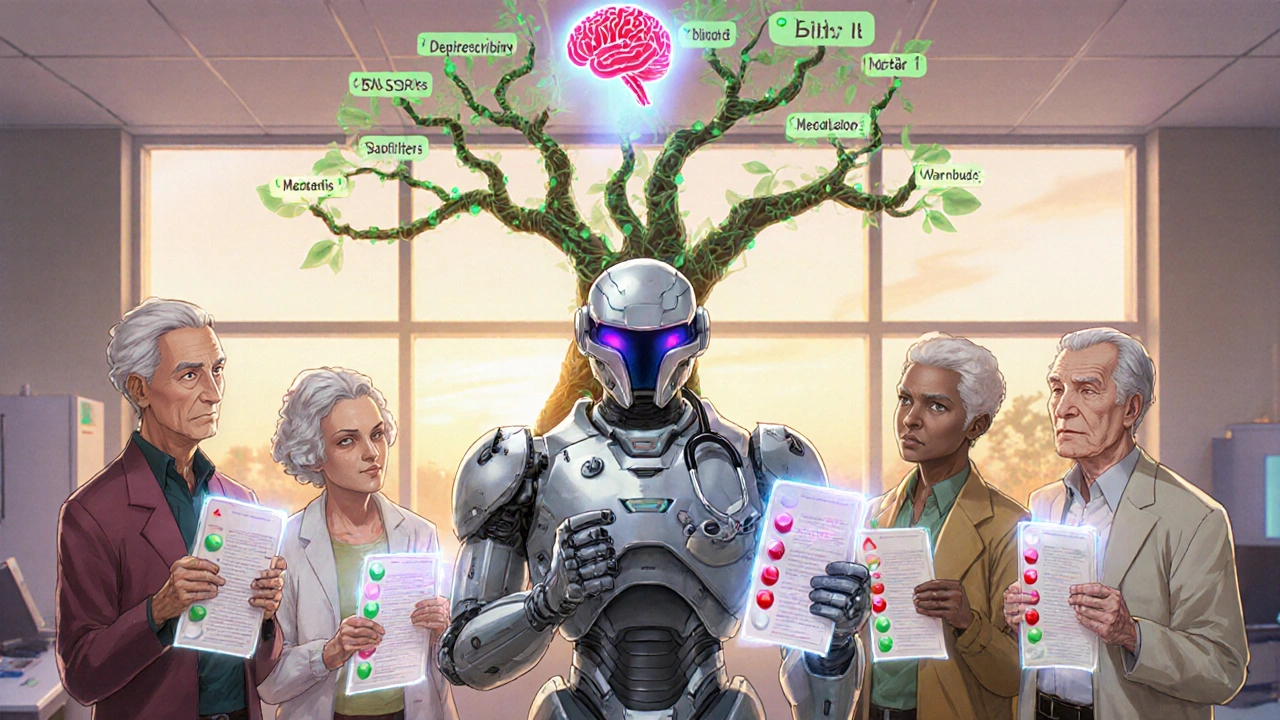 Nov, 25 2025
Nov, 25 2025
Anticholinergic Burden Calculator
Calculate Your Anticholinergic Risk
This tool estimates your cumulative anticholinergic burden based on your medications. The Anticholinergic Cognitive Burden (ACB) scale rates drugs from 0 to 3, with higher scores indicating greater brain risk.
Add Your Medications
Your Medication List
Your Anticholinergic Burden
Total ACB Score
Current Risk Level
Important Notes
This tool is for educational purposes only. It does not replace medical advice from your physician.
Do not stop any medication without consulting your doctor first. Some medications require gradual tapering.
See the article for details on safer alternatives and deprescribing protocols.
Many older adults take medications for common issues like allergies, overactive bladder, depression, or insomnia without realizing one hidden danger: these drugs might be quietly harming their brain. Anticholinergic medications block acetylcholine, a key chemical in the brain that helps with memory, attention, and learning. While they work well for their intended purposes, growing evidence shows that long-term use is linked to a higher risk of dementia and measurable brain changes.
What Are Anticholinergic Medications?
Anticholinergic drugs stop acetylcholine from doing its job in the nervous system. This can reduce muscle spasms, dry up secretions, or calm overactive nerves. Common examples include diphenhydramine (Benadryl), oxybutynin (Ditropan), amitriptyline (Elavil), and even some sleep aids and motion sickness pills. About 100 of these drugs are available, both by prescription and over the counter.
They’re often prescribed for conditions like overactive bladder, chronic pain, depression, Parkinson’s, and allergies. But here’s the catch: many of these drugs cross the blood-brain barrier, meaning they don’t just affect the body-they directly interfere with brain function. Tertiary amines like amitriptyline and doxepin penetrate the brain more easily than quaternary compounds like glycopyrrolate, which stay mostly outside the CNS. That’s why some anticholinergics are far more dangerous for thinking skills than others.
The Link Between Anticholinergics and Dementia
Studies now show this isn’t just about temporary confusion or drowsiness. Long-term use is tied to actual brain changes. A 2019 study using data from the French National Health Insurance system found that people who took anticholinergic drugs for more than 1,095 total daily doses over three years had a 49% higher risk of developing dementia. That’s not a small number-it’s nearly double the risk.
Brain scans from the Alzheimer’s Disease Neuroimaging Initiative revealed something even more concerning. People on these drugs showed 0.5% to 1.2% more annual shrinkage in the hippocampus and amygdala-areas critical for memory. Their brains also used 4% to 8% less glucose, a sign of reduced activity. These aren’t random findings. They mirror early signs of Alzheimer’s disease.
The risk isn’t the same for every drug. Antidepressants like amitriptyline carried the highest risk, with a 29% increased chance of dementia. Antipsychotics came next, followed by bladder medications like oxybutynin and solifenacin. But trospium, another bladder drug, showed no increased risk. That’s important: not all anticholinergics are created equal. Some are far safer than others.
How Risk Builds Over Time
It’s not about taking one pill. It’s about cumulative exposure. Think of it like a slow leak in a boat. Each dose adds up. The Anticholinergic Cognitive Burden (ACB) scale rates drugs from 0 (no effect) to 3 (strong effect). A person taking multiple drugs with a score of 2 or 3 over years can accumulate a high total burden-even if each drug seems harmless alone.
A 2023 BMJ Open study clarified this: short-term use (under a year) showed no significant dementia risk. But long-term use (over three years) raised the risk by 25%. This suggests the damage is gradual. It’s not sudden. And it’s often invisible until it’s too late.
Doctors used to think cognitive side effects were temporary. Now we know they can be lasting. One patient on Reddit shared that her mother’s MMSE score-used to measure cognitive function-dropped from 28 to 22 over eight years on amitriptyline. After stopping the drug, her score stabilized but never returned to normal.

Who’s Most at Risk?
People over 65 are the most vulnerable. About 10-15% of adults in this group regularly take at least one anticholinergic drug. That’s 15 to 20 million people in the U.S. alone. Many don’t realize they’re taking one-especially if it’s an OTC sleep aid or allergy pill.
Those with a family history of Alzheimer’s or who carry the APOE-ε4 gene are at even higher risk. The PREPARE trial, currently underway, is testing whether stopping these drugs in healthy people with this genetic risk can delay or prevent dementia. Early signs suggest it might.
Women are also more likely to be prescribed bladder medications like oxybutynin, putting them at higher exposure. And because older adults often take multiple medications, the combined effect can be worse than any single drug.
What Can Be Done?
It’s not about cutting all anticholinergics overnight. Many people need them. But there are safer alternatives.
For overactive bladder, mirabegron (Myrbetriq) works just as well as oxybutynin but has an ACB score of 0. No brain impact. For depression, SSRIs like sertraline or escitalopram are far safer than tricyclics like amitriptyline. For insomnia, cognitive behavioral therapy (CBT) is more effective long-term than diphenhydramine.
Deprescribing isn’t simple. Stopping suddenly can cause withdrawal-worsened bladder symptoms, rebound insomnia, or even delirium. The process needs to be slow: 4 to 8 weeks, with close monitoring. The Canadian Deprescribing Guidelines offer clear steps for this.
Doctors are starting to use tools like the ACB calculator, built into systems like Epic EHR since 2018. But here’s the problem: only 37% of primary care physicians routinely check for anticholinergic burden in patients over 65-even though 89% say they know it’s risky.

What Patients Should Do
If you or a loved one is on any of these medications, don’t panic. But do ask questions.
- Ask your doctor: Is this drug anticholinergic?
- Ask: What’s the ACB score?
- Ask: Are there non-anticholinergic alternatives?
- Ask: Can we try a lower dose or stop it?
Check your medicine cabinet. Many OTC products contain diphenhydramine or doxylamine. Read labels. Look for “sleep aid,” “nighttime cold medicine,” or “allergy relief.” These are common hidden sources of anticholinergic exposure.
Keep a list of all your medications-prescription, OTC, and supplements. Bring it to every appointment. Ask your pharmacist to review it for anticholinergic load. Most pharmacies now offer this service for free.
Why This Matters Now
The Alzheimer’s Association estimates that reducing anticholinergic use could prevent 10-15% of dementia cases each year. That’s over half a million cases globally. In the U.S., this could mean fewer people needing long-term care, fewer families overwhelmed by caregiving, and billions saved in healthcare costs.
Regulators are catching up. The FDA added stronger warnings to 14 anticholinergic drugs in 2020. The EMA restricted seven bladder drugs for elderly use in 2021. The American Geriatrics Society’s Beers Criteria now explicitly says: avoid strong anticholinergics in older adults.
And the industry is responding. Seven new bladder treatments and three new antidepressants are in late-stage trials-all designed to avoid the brain. This isn’t just a medical shift. It’s a market shift. Analysts predict a $1.3 billion move toward safer alternatives in the next decade.
Final Thoughts
Medications are supposed to help. But sometimes, the cure becomes part of the problem. Anticholinergic drugs are a quiet threat-easy to overlook, slow to damage, and hard to reverse. The good news? You don’t need to wait for a diagnosis to act. If you’re taking one of these drugs, especially long-term, it’s worth having a conversation with your doctor. Ask if it’s still necessary. Ask if there’s a safer option. Your brain will thank you.
Bea Rose
November 25, 2025 AT 17:04Michael Collier
November 27, 2025 AT 03:01Shannon Amos
November 28, 2025 AT 05:57Jaspreet Kaur
November 28, 2025 AT 18:00Gina Banh
November 28, 2025 AT 20:58Deirdre Wilson
November 28, 2025 AT 21:54Ryan C
November 29, 2025 AT 23:30Dan Rua
December 1, 2025 AT 19:46Mqondisi Gumede
December 2, 2025 AT 19:58Douglas Fisher
December 3, 2025 AT 19:42Albert Guasch
December 3, 2025 AT 23:18Ginger Henderson
December 4, 2025 AT 16:11Bethany Buckley
December 4, 2025 AT 22:51Stephanie Deschenes
December 5, 2025 AT 06:14Cynthia Boen
December 6, 2025 AT 07:28